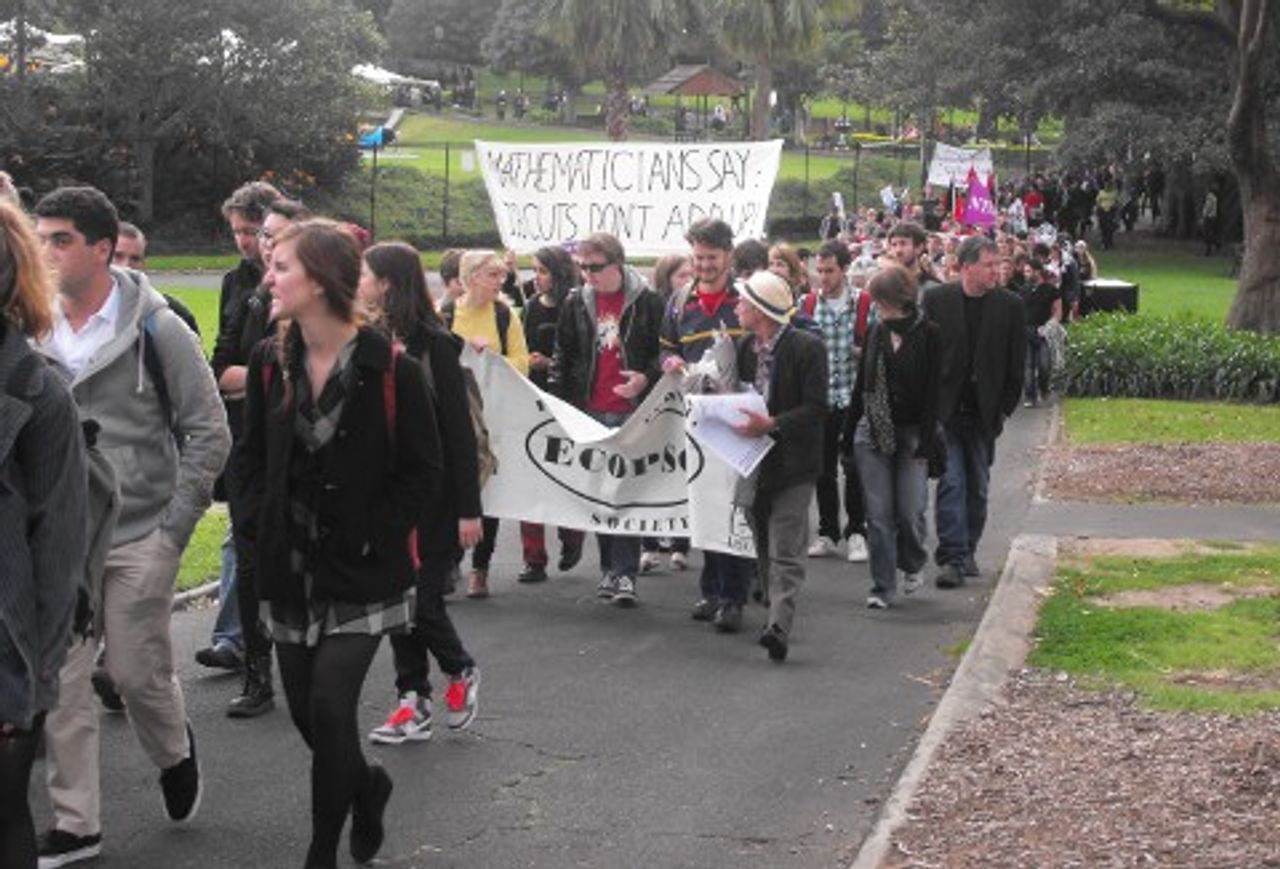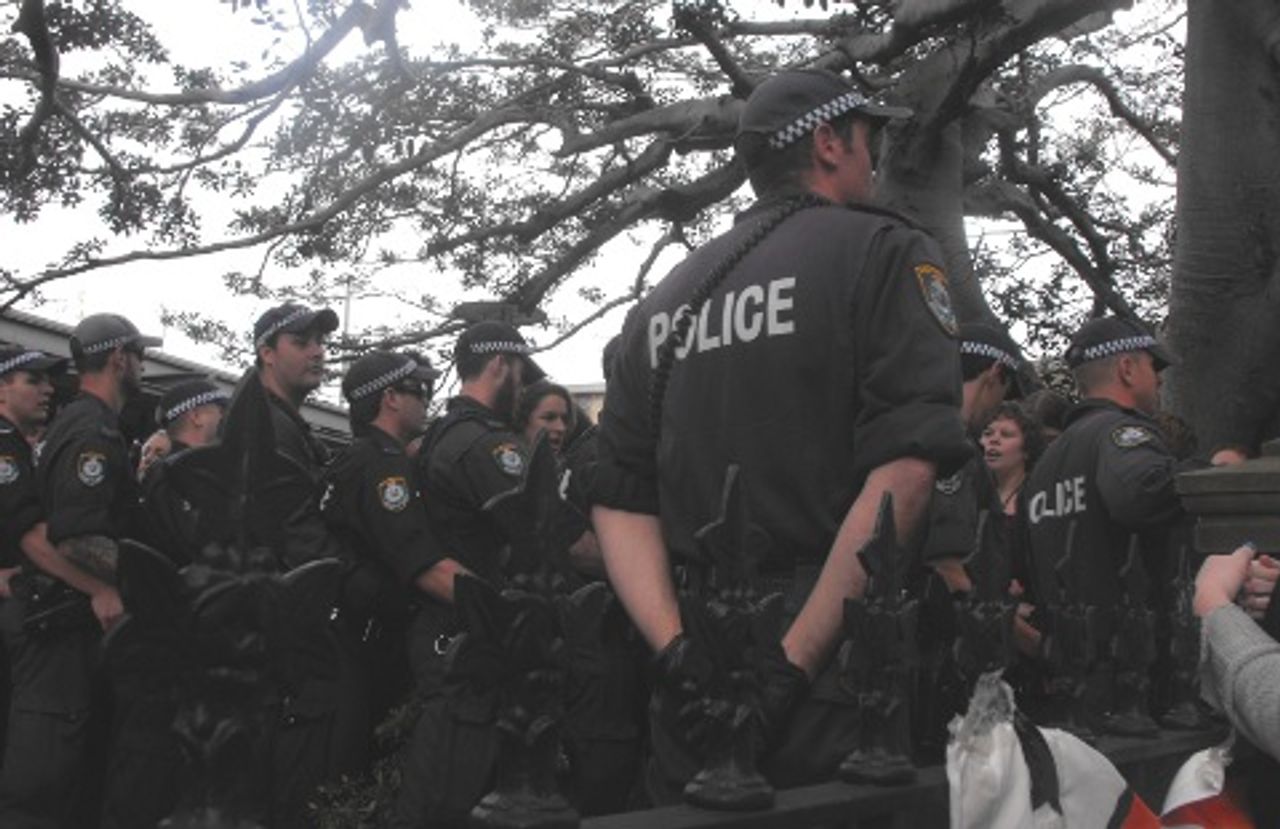Police were deployed on Monday to violently disperse a group of students protesting against the destruction of jobs underway at the University of Sydney. The state violence follows rallies and demonstrations over the university administration’s plans to eliminate as many as 140 academic positions and up to 190 general staff jobs. The job-shedding at University of Sydney is part of a broader assault taking place at universities around the country, as administrations restructure their operations to conform to the cost-cutting dictated by the federal Labor government’s higher education policies.
The police, including members of the specialised Riot Squad, had been deployed to intimidate both staff and students taking part in the latest rally organised by the National Tertiary Education Union (NTEU) and the Education Action Group, a student grouping dominated by pseudo-left organisations such as Solidarity, Socialist Alliance and Socialist Alternative. As speakers addressed the audience, a police officer openly recorded video footage of the participants.
 Protest march through Victoria Park
Protest march through Victoria ParkThe protest was timed to coincide with an announcement that 23 academics would be offered voluntary redundancy and another 20 demoted to a “teaching only” status, stripping them of many of the conditions associated with academic tenure. In March, management postponed specific job cuts until May 7 in order to allow time for further negotiations with the NTEU. At campuses across Australia, the NTEU has agreed to a wave of job losses over the past two years. The initial job destruction at University of Sydney will be only the first instalment of a series of redundancies between now and August.
Opposition to the job cuts is widespread at University of Sydney. Previous protests have been attended by between 500 and 1,000 staff and students. On Monday, following NTEU and Education Action Group speakers, as many as 1,000 people joined a march through the nearby Victoria Park and along City Road to the Darlington Centre, where the university’s Senate was scheduled to be holding its regular management meeting.
After the NTEU organisers ended the rally, some 60 students associated with the Education Action Group decided to occupy the Darlington Centre to prevent the administration meeting taking place. As they sought to exercise their right to protest, however, they were attacked by the assembled police. A YouTube video filmed by one of the student participants graphically shows the violence used to drag protesters from the building and block others from assisting them. Three people were arrested and taken to a nearby police station, where they were later released without charges. A police officer fractured her arm during the incident, giving rise to false reports in the media that implied the violence stemmed from the actions of the students, rather than the police.
The methods used to break up the University of Sydney protest are part of a wider use of police to suppress protests over social and political issues. The relatively small Occupy protests in Australian cities last year were among the first in the world to be violently dispersed by night-time police raids. The establishment of picket lines by sacked workers have been met by the deployment of police and private security companies.
 Police at Darlington
Police at DarlingtonThe use of the police against a university campus protest underscores the nervousness of both the administration and the Labor government at the stirrings of student opposition to a deepening offensive on tertiary education. On top of the job cuts that have been taking place at universities, the Labor government’s budget, delivered last night, imposed further increases in Higher Education Contribution Scheme (HECS) tuition costs for mathematics and science students and stripped student allowances from young people who study for a large part of their degree at overseas universities.
There is also growing anger among students at both universities and vocational Technical and Further Education (TAFE) colleges over overcrowded lectures and tutorials, and over-stretched and inadequate facilities. These conditions are the product of inadequate funding to cover the expansion of student places—a situation that will be accentuated by yesterday’s federal budget.
On Monday, both NTEU and Education Action Group representatives at University of Sydney once again claimed that protests against management would reverse the cost-cutting and made no mention of the policies of the Labor government. However, their attempts to present the job losses and general erosion of standards as simply the outcome of poor management decisions are wearing thin, as more students become aware of the extent of the crisis throughout the university and higher education system. Academic jobs and conditions are also being slashed at the University of NSW and Macquarie University in Sydney, the Australian National University in Canberra and Queensland University, following earlier cutbacks at campuses in Victoria and Western Australia. Hundreds of job cuts are now being predicted at TAFE colleges as a result of budget shortfalls.
The Labor government’s turn to budget austerity sets the stage for a devastating assault on higher education. The funding pressures that have been imposed by Labor on the university system make it inevitable that there will be demands for sharp rises in student fees, the scrapping of courses and the slashing of student numbers—as young people in Europe, the United States, Canada and New Zealand are already confronting.
The defence of education requires a political struggle against the Gillard government, and a break from the politics of the unions and the pseudo-left organisations that function as apologists for Labor’s agenda. The Socialist Equality Party and the International Student for Social Equality are campaigning on university campuses and TAFEs around the country for staff and students to turn to the fight for a workers’ government based on socialist policies. The fundamental social right to a free, high quality education can only be secured by placing the banks and major corporations under public ownership and democratic control and organising them on the basis of socialist planning.
